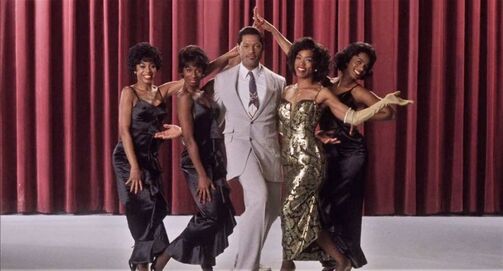TBD | Tina Turner ascends to stardom under the cruel shadow of her abusive husband Ike. Directed by Brian Gibson Starring Angela Bassett and Laurence Fishburne Review by Jon Kissel |

To give maximum charity to What’s Love Got To Do With It, one would have to place it before the run of Lifetime movies with long titles that were always about women escaping violent marriages. Without digging into basic cable history, I’ll give the film the benefit of the doubt and assume that’s the case. Therefore, it becomes culturally valuable for the film to show how a woman can stay in a situation as dire as this one, and how difficult it is to get out. Gibson skirts past the eventual court hearings and the way that the children take sides, leaving the logistics of breaking away in favor of the psychological distance that Tina has to clear before she can get out. The film does an excellent job in its first act in showing how Ike got his claws into her, identifying her timidity and squashing her with his power and force of personality. He takes his time, weaseling consent out of her on the same night his previous girlfriend and the mother of his children is in the hospital with a self-inflicted gunshot wound. Whether he’s in bed or on a plane, his preferred sleeping method is pinning his partner down with his body. Neither colleagues nor bystanders stand up for her as things get worse. There’s no grand moment of freedom for Tina, but years of slowly building up the courage to finally cross the street and check into that Ramada Inn. What’s Love Got To Do With It is so deliberate in how it builds to that moment, that there’s no time to focus on much else.
Someone as powerful on stage as Tina having to play meek and submissive at home contributes to how striking her story is, doubly so when she’s played by someone with Bassett’s stature. Tina Turner is a singular performer with an iconic look, and her biopic succeeds where others fail because it doesn’t treat her particular bag of talents as a mystery to be solved. The viewer doesn’t come out of the movie understanding where her vigor comes from, or what her musical goals are, or how the cultural landscape was changed by her presence. Bassett didn’t learn to sing like Turner, though if she had more preparation, she surely would’ve tried. The movie is most interested in the distinction between the public and private persona, where someone with arms like Angela Bassett’s and the command of a room like Tina Turner could still be totally cowed by a husband with a shred of her talent. Phil Specter’s wall of sound is what’s needed for a voice like Tina’s, not Ike stalking around uselessly in the middle ground. The story of this generational talent becomes relatable to a wide audience in how her potential is squashed and almost extinguished by a mediocre man.
This review’s being written in the wake of Bassett not winning an Oscar and reacting with visible disappointment when someone else’s name is announced. It would certainly have been credible for her to have won here in a kind of role that Oscar voters have frequently rewarded. She projects indomitability on stage, even when she doesn’t want to be there amidst exhaustion and Ike-inflicted guilt. The film also provides her with plenty of opportunities for visceral terror, another Oscar asset. Being able to do a killer performance of Proud Mary and begging a Ramada Inn manager for a room is a wide range, and though the mid-30’s Bassett has a hard time pulling off teenage Tina, nothing else is questionable. Fishburne’s unpredictable malevolence stays constant while Ike’s hairstyle keeps changing. An unreformed villain, he portrays one of the worst husbands/fathers in the wake of playing one of the best two years earlier in Boyz N the Hood. His Ike is the definitive wife beater, fragile and reactive towards every slight, perceived or otherwise, and ready to fly off the handle at a moment’s notice. If the real Tina and Ike story ended with him shooting her in a dressing room, it would have been a banal and predictable culmination to a dynamic that gets recapitulated over and over again.
The Wikipedia page for What’s Love Got To Do With It has an extensive section on inaccuracies, up to and including the fact that Tina had a baby boy before she and Ike got together. Tina is not a big fan, as it makes her look like she spent years as a cowering victim, but an ecstatic truth exists here even as a literal one is pushed aside. Tina became inspirational once she published her memoirs, which this film is based on, and Gibson and writer Kate Lanier translate that inspiration to the screen. The best movie about Tina Turner’s life is probably the one where she struggles to survive in the wake of the divorce, clawing to get back on stage and feed her family while Ike absconds with all her earnings and her recording rights. The movie that exists is worthy of her legacy, but I’d wager that the documentary Tina is better. B
 RSS Feed
RSS Feed